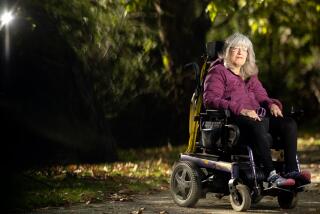Kaiser Told to Pay $3.1 Million to Paralyzed Athlete
- Share via
An arbitration panel ordered Kaiser Foundation Hospitals to pay a paralyzed El Cajon man and his parents $3.1 million in what is believed to be the largest medical malpractice judgment ever levied against the health maintenance organization.
Todd Iseminger, 25, a former sports star who lost the use of his legs after doctors failed to diagnose a spinal infection, will receive a lump sum payment of $2.8 million. His parents, also of El Cajon, were awarded the remaining $300,000.
Kaiser attorney Don Ruston would not return repeated telephone calls and hospital officials refused to comment on the case, Kaiser spokeswoman Janice Seib said.
The case was decided by a three-member arbitration panel because Kaiser requires patients to waive the right to a jury trial when they enroll in the health plan. The panel’s decision, announced Tuesday, cannot be appealed.
Iseminger, a former San Diego State University basketball player majoring in physical education, was complaining of severe back pain and a high fever when he came to the emergency room at Kaiser Permanente on Zion Avenue on Easter Sunday 1987.
The first doctor who saw him “did virtually no examination,” Craig McClellan, one of Iseminger’s attorneys, said yesterday. “He said ‘you probably have the flu. Go home, take it easy and take some Tylenol.’ He didn’t take his pulse, didn’t check his respiration, didn’t take his shirt off, didn’t check his back pain. He did virtually nothing.”
The next day, Iseminger returned to the hospital with his parents, but a full day passed before he was submitted to tests that would have alerted doctors that something was wrong, McClellan said. One doctor went to dinner without ordering the proper tests and another doctor simply refused to come into the hospital, he said.
It was Tuesday afternoon when doctors finally discovered an epidural abscess on Iseminger’s spine. By that time, the infection had caused permanent damage.
Iseminger, who is now confined to a wheelchair, said he endures “more pain in a day than most people have in a lifetime.”
He said he was happy about the award, but that a significant portion of it would go toward medical bills and attorneys’ fees. “It’s going to allow me to do some things I probably wouldn’t have been able to do,” he said. “But if I could have it my way, I’d rather not have the money and be able to go out and play basketball and golf.”
Although he recently enrolled again at San Diego State, he said his career “really is up in the air. I totally had to reconstruct my life from the ground up.”
Kaiser did not dispute its liability for the delay in Iseminger’s treatment. In exchange for not having to prove the hospital’s negligence, Iseminger’s attorneys agreed not to pursue punitive damages against the hospital, Iseminger’s other attorney, R. Craig Clark, said.
The three doctors named in the lawsuit were family practice physician Mitsuo Tomita, neurologist Leonard Gosink and radiologist Eric Daniels. None of them were disciplined or terminated as a result of the case, Kaiser spokeswoman Seib said.
The three-member arbitration panel who decided the case was composed of two attorneys and former presiding Superior Court Judge Franklin Orfield.
More to Read
Sign up for Essential California
The most important California stories and recommendations in your inbox every morning.
You may occasionally receive promotional content from the Los Angeles Times.













